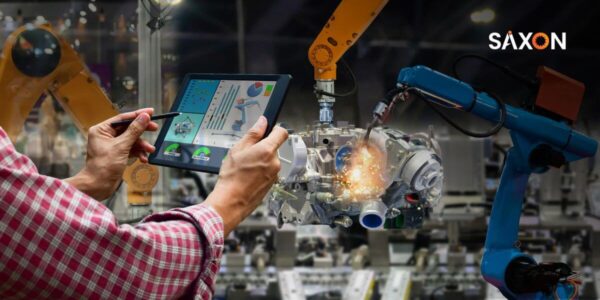Manufacturing organizations expect to generate more data than ever before. As per Deloitte’s AI adoption survey in manufacturing:
- Around 1,812 petabytes of data generation is estimated in manufacturing every year, relatively more than banks and financial services, retail, and many other industries
- 93% of manufacturing organizations believe that AI is crucial for growth and innovation in the sector
- 91% of AI projects failed to deliver on the benefits or the time invested
- More than half of the organizations expect significant value and positive impact from their AI projects in the next 2-5 years
AI is a potential game-changer at every level of the value chain in the manufacturing sector. Organizations that embrace AI in their end-to-end business operations will witness reduced downtime, greater efficiency, best quality, better predictability to identify points of failure, lower operational costs, and higher production time.
While this is true, not every manufacturer has graduated from their pilots and PoCs to widespread adoption of AI across the business. These varying levels of adoption are primarily due to the lack of executive sponsorship and availability of technical skills.
An organization’s failure to realize AI’s potential could imply missing out on exponential gains and competitive advantage.
Why do manufacturers lag in AI maturity?
Manufacturers often get stuck in their path in the AI maturity curve. The momentum stalls after early gains in cost reduction, intelligent automation, and predictive modeling use cases. Businesses that transform into AI-fueled enterprises stay ahead of those who try a few use cases. What is the differentiator between them?
Collective Leadership – AI is not a space where only the first mover wins. All businesses have equal access to AI tools and technologies. It is up to technologists, data scientists, and C-suite leaders to collaboratively identify the use cases and value propositions. Establishing a data governance framework with all the stakeholders sets the true vision for continuous AI implementations.
Shared Vision for AI Value – Business functions seek different values from AI. Not all of them seek the same results from AI implementations. Operations teams look for efficiencies; supply chain teams are interested in predictive demand forecasting and inventory planning. The challenge lies in sharing the AI vision and articulating the typical business value derived from different use cases.
Technical Skills – As per Gartner, more than 50% of IT leaders believe that the technical skills gap is one of the most significant barriers to AI adoption. Bridging the talent gap is not about attracting the top AI talent but upskilling the existing teams.
The key to AI maturity, from AI-curious to AI-first, is developing a roadmap with a well-defined future state and steps to thread from your current state. Most business leaders are behind in clearly grasping the current or future states.
The Shift Through Stages in AI Maturity
AI curious – Enterprises that are still exploring the possibilities AI can offer to their organization. They do not have a use case identified, and the business value of AI is not clear at the leadership level.
AI Initiated – Enterprises have found at least one champion experimenting with PoC’s in a selected area. They are looking to transition from PoC to actual production.
AI Aligned – Leadership in favor of larger roll-out of AI-driven environment. More than one function leveraging AI for automating their workflow.
AI Integrated – AI is scaling efficiently with multiple AI models in production and adopting a factory model for AI deployment.
AI-First – The underlying component is developing an unfair advantage by creating products/services with AI.
Manufacturers are in the initiated or aligned stage and have great potential to gain as they progress in the maturity framework over three to five years. Fundamentally, organizations need to develop AI-first DNA.
Key Drivers for AI Maturity in Manufacturing
Strategy –
is about providing a clear-cut vision and plan from leadership for execution to reach the desired maturity level. Key points to consider for building an effective AI strategy are:
a. Understanding organization strengths, technology maturity, and availability of resources
b. Identifying the market trends and potential disruptions
c. Ethical issues governing the industry
Data –
is the foundation layer for a successful AI deployment as they influence the behavior of the models and algorithms. The attributes of data that matter the most are:
a. Availability of clean, quality, meaningful and optimum data sets needed for training
b. Fair representation to cover a broad range of use cases
Technology –
is the enabler that encompasses tools, techniques, frameworks, and infrastructure that translates strategy into execution. The key considerations when dealing with technology are:
- How will my current technology choice address the short-term and long-term needs?
- Does it have interoperability that provides me the freedom to make changes in the organization’s technology landscape?
- What underlying ethical implications may it hold for an enterprise’s reputation?
People –
that dimension of any enterprise initiative responsible for success or failure. AI adoption seeks a mindset shift that needs to occur in every stakeholder. It begins with busting the myths surrounding the impact of AI in their work and moves towards upskilling to use AI as another resource. The key aspects that influence the people’s dimension in scaling up AI are:
a. Leadership belief and commitment towards AI vision
b. Evangelization and training plan for bringing people up to speed
c. Ownership and accountability of AI/automation models
Governance –
as organizations discuss the benefits AI can bring to the table in the same breath, they also voice the risks apprehensions associated with it. AI governance means that AI is explainable, transparent, and ethical. But these three words may mean different things to a different organization or to various stakeholders inside the organization. The steps one should consider while putting together an AI Governance framework are:
- Define the areas that it encompasses
- Define the critical measures of safety and how they will apply to various scenarios
- Clarity of accountability for the ethical aspects of AI roll-out
How do you propel AI Maturity in Manufacturing?
You cannot adopt a fast follower approach to transform the AI maturity curve. It is a win-win for those who launch the AI-first march and accelerate the AI maturity curve. How do you do it?
- Leverage a data governance model with all the stakeholders – leadership, technologies, data scientists and work collectively to identify discrete use cases and opportunities.
- Bring in agility to leverage advanced technologies and use AI to pivot in the rapidly changing customer behavior, supply chain, and marketing channels.
- Identify opportunities to connect to AI use cases and then acknowledge the value with the outcomes. It can help manufacturers shift toward an AI-inspired transformation mindset.
It is clear that the momentum of AI is growing, and it will continue to shape the future of manufacturing organizations. Enterprises that have not already embarked on the AI journey will have to take urgent steps and move briskly to stay relevant in the industry. Those that fail to do this will be left behind—and could be looking at a widening gap that will be hard to bridge as time progresses.
Are you curious to know more about the AI use cases in manufacturing? Get in touch with our experts.
















